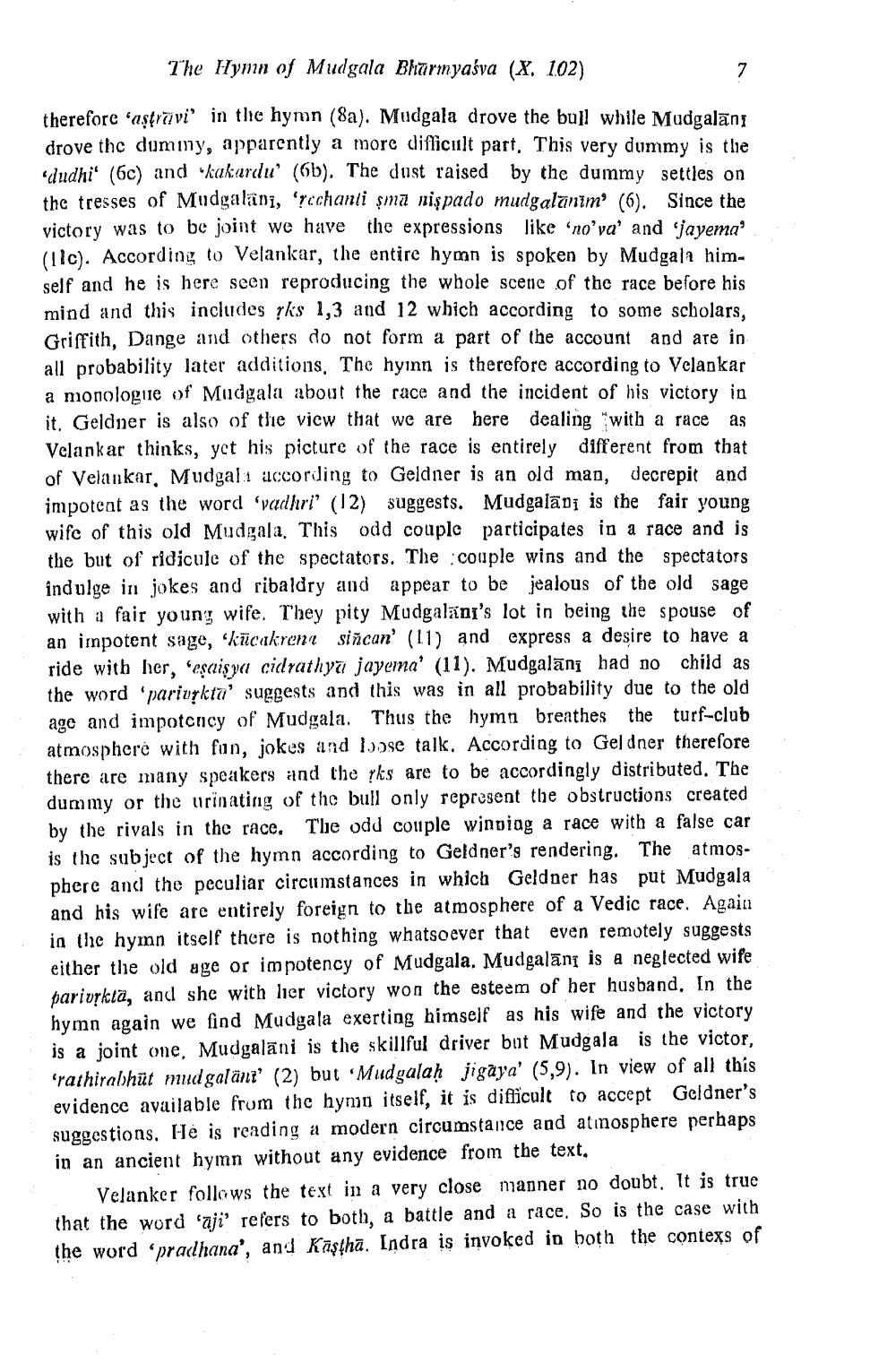________________
The Hymn of Mudgala Bharinyaśva (X. 102)
therefore "astrüvi' in the hymn (8a). Mudgala drove the bull while Mudgalāni drove the dumuy, apparently a more diflicult part. This very dummy is the Gudhi (60) and kakardu' (6b). The dust raised by the dummy settles on the tresses of Mudgalani, 'rochanti șma nispado mudgalanim (6). Since the victory was to be joint we have the expressions like 'no'ya' and 'jayema (c). According to Velankar, the entire hymn is spoken by Mudgala himself and he is here seen reproducing the whole scene of the race before his mind and this includes ?ks 1,3 and 12 which according to some scholars, Griffith, Dange and others do not form a part of the account and are in all probability later additions. The hyinn is therefore according to Velankar a monologue of Mudgala about the race and the incident of his victory in it. Geldner is also of the vicw that we are here dealing with a race as Velankar thinks, yet his picture of the race is entirely different from that of Velankar, Mudgali according to Geldner is an old man, decrepit and impotent as the word 'vadhri' (12) suggests. Mudgalādi is the fair young wife of this old Mudgala. This odd couple participates in a race and is the but of ridicule of the spectators. The couple wins and the spectators indulge in jokes and ribaldry and appear to be jealous of the old sage with a fair young wife. They pity Mudgalani's lot in being the spouse of an impotent sage, 'kücukrent sincan (11) and express a desire to have a ride with her, "eşaisya cidrathya jayema' (11). Mudgalāni had no child as the word 'pariurkta' suggests and this was in all probability due to the old age and impotency of Mudgala. Thus the hymn breathes the turf-club atmosphere with fun, jokes and loose talk. According to Geldner therefore there are many speakers and the yks are to be accordingly distributed. The dummy or the urinating of the bull only represent the obstructions created by the rivals in the race. Tlie odd couple winding a race with a false car is the subject of the hymn according to Geldner's rendering. The atmos phere and the peculiar circumstances in which Geldner has put Mudgala and his wife are entirely foreign to the atmosphere of a Vedic race. Again in the hymn itself there is nothing whatsoever that even remotely suggests either the old age or impotency of Mudgala. Mudgalant is a neglected wife parivkta, and she with lier victory won the esteem of her husband. In the hymn again we find Mudgala exerting himself as his wife and the victory is a joint one, Mudgalāni is the skillful driver but Mudgala is the victor, rathirabhüt mudgalānt' (2) but Mudgalaḥ jigaya' (5,9). In view of all this evidence available from the hynin itself, it is difficult to accept Geldner's suggestions. He is reading a modern circumstance and atmosphere perhaps in an ancient hymn without any evidence from the text.
Velanker follows the text in a very close manner no doubt. It is true that the word 'ai' refers to both, a battle and a race. So is the case with the word 'pradhana', and Kastha. Indra is invoked in both the contexs of




